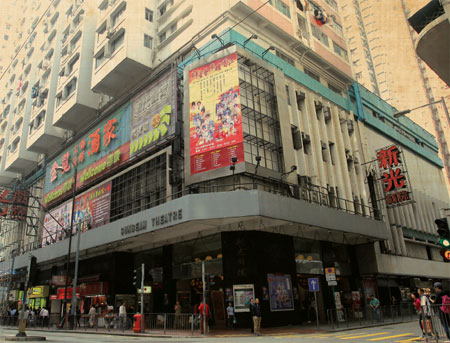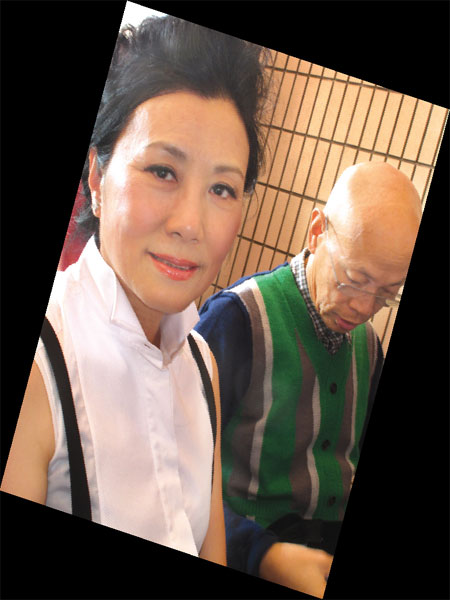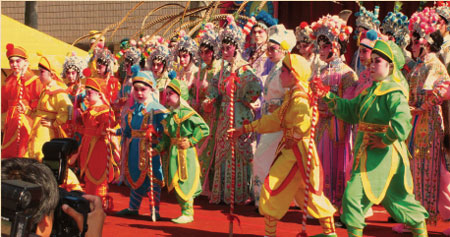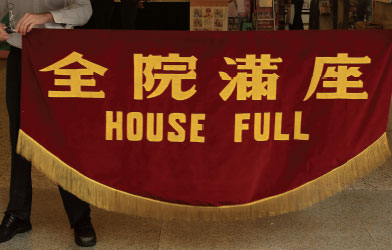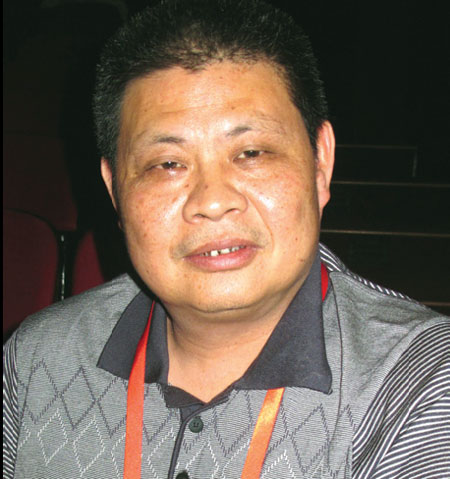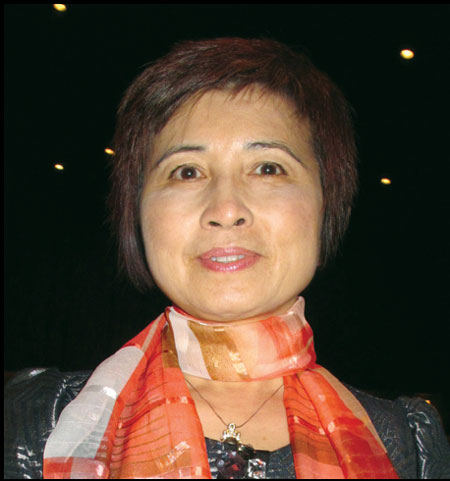The last aria
Updated: 2011-12-08 07:42
By SL Luo(HK Edition)
|
|||||||
|
Sunbeam Theatre's closure is expected to lead to a crunch in well-equipped venues for the staging of opera shows. Edmond Tang / China Daily |
|
Veteran television and opera star Liza Wang (left) says Hong Kong must produce adequate world-class opera performance venues to keep the industry alive and to stir greater interest in Chinese culture and the arts. SL Luo / China Daily |
|
"Cantonese Opera Day" has become an annual feature in Hong Kong to promote the legendary Chinese art and introduce it to tourists from abroad. SL Luo / China Daily |
|
The "House Full" sign goes up for a performance by a mainland opera troupe at Sunbeam Theatre. Edmond Tang / China Daily |
The landmark Sunbeam Theatre in North Point, famous for its Cantonese opera shows over the past two decades, will close its doors in February, for the last time. Opera veterans are confident that the legendary Chinese art will not disappear, despite the theater's impending demise, and are appealing for greater support from the government and the community to keep the torch alight. SL Luo reports.
I've never walked into a cinema lobby, let alone sitting down and watching a movie or an opera, for more than 40 years.
But, I broke with tradition and forced myself to sit through a grueling three-hour play by a vivacious Cantonese opera troupe from Guangdong province in November at the iconic Sunbeam Theatre in North Point. This "cradle" of Chinese operas has been playing host to consecutive full houses of mostly elderly freaks of the vernacular Chinese art since the late 1980s.
Throughout that evening's performance, I had hoped to grab a slice of nostalgia from some of the colorful closing epilogues at the 39-year-old venue as the countdown began for the theater's final journey into history.
The play, entitled "Pining For Zhujixiang", epitomizes the fate of a gui fei (imperial concubine) during the Song Dynasty. She was forced to flee after incensing a high-ranking official. The woman attempted suicide, but was rescued by a merchant who took her to Zhujixiang county in the historic city of Nanxiong in northern Guangdong. There love blossomed between them. Imperial forces later traced her to her hideout and attacked Zhujixiang to try to take her home. In order to protect the villagers from being slaughtered, the concubine again attempted suicide and succeeded this time by jumping into a well.
It was a star-studded cast from the 60-member troupe, which included Jiang Wenduan, who won the 2011 Plum Blossom Prize for outstanding opera performance - the country's highest theatrical award by the China Theatre Association.
The melancholic tones of the play drew a synchronized eerie silence from the packed audience. Sometimes the silences were punctuated by applause, in each of the five episodes, with the scripts belted out in a succinct, impeccable crystal-clear fashion.
Such is the mood that has pervaded the 1,000-seat auditorium at Sunbeam Theatre, which saw humble beginnings when it started off in September 1972, and has since come of age. With a spacious lobby and auditorium on the ground floor, initially, it was used for screening selected Chinese-dialect and English-language films, but without xi qu (Chinese opera) or Mandarin variety shows.
Together with an adjacent China Products Department Store, Sunbeam Theatre was among scores of landmark movie houses across Hong Kong and Kowloon built by industrious Shanghai emigrants who had settled in the North Point area as successful traders in the 1950s.
In the late 1980s, the theater was divided into two auditoriums, with the larger one on the ground floor converted for stage performances. The 300-seat Dress Circle above is today used mainly for rehearsals by opera groups from Hong Kong and the mainland. The venue underwent a major face-lift in 2007, with a multi-purpose theater rebuilt for stage shows.
Management changed hands several times and, on one occasion, it was rumored to have been saved from financial ruin through a substantial cash injection by the late State leader and Hong Kong property tycoon, Henry Fok Ying-tung.
Almost every prominent opera troupe from the mainland has graced the halls of Sunbeam Theatre, entertaining consecutive full houses, earning the theater the honor of being "Hong Kong's Xi Qu Palace Hall".
The theater saw particularly intense activity, both theatrical and political, in the early and mid-1970s. During the years following the "cultural revolution" (1966-1976), the entire 80,000-square-foot property on King's Road was bathed in red-and-white, multi-character banners and buntings. Loudspeakers mounted on all sides of the building blared out slogans and revolutionary music, making it almost impossible for any passerby to miss the building.
Thanks to the dearth of opera venues of Sunbeam's capacity, Hong Kong and mainland opera groups rotated among themselves for performances. Many of the performances were sponsored by charitable organizations for the benefit of Hong Kong's hordes of elderly opera fans. For non-sponsored shows, tickets, priced from as low as HK$60 for back seats to HK$500 for front rows, went on sale two weeks in advance, and chances were you would have to wait for another week if you just wanted to do a walk-in.
Sunbeam Theatre, however, will bid farewell to its hoards of loyal opera fans in February next year, when the shutters come down for the final time. The theater's lease expires then, and the property investment firm that bought the site in 2003 for more than HK$160 million, is unwilling to extend the lease.
The theater was saved from bulldozers after the purchase, when the government intervened and renegotiated a three-year lease extension with the developer. Now the developer plans to tear down the old theater and build an up-market shopping complex. Chances of giving the venue a new lease seem so far remote that only a miracle can possibly prevent its demise.
Guo Yongzhong, publicity manager of the Zhujixiang Descendants Association of Guangdong Nanxiong, says he felt grieved and happy coming to Hong Kong to help revive centuries of Chinese culture for Nanxiong descendants who have settled in the SAR, many of them from as far away as Malaysia, Singapore and the United States.
"This is our first and, probably, our last opera performance at Sunbeam Theatre and, through this event, we want our descendants to realize that the livelihood of their ancestors had not been a bed of roses," he says.
The association, which organized and sponsored "Pining for Zhujixiang", is one of the three major opera groups of the Hakka, Teochew and Cantonese communities in the Pearl River Delta (PRD). Based in Guangzhou, the group was set up in 1995 with a mission to promote Chinese cultural and arts exchanges as well as to assist the development and training of xi qu throughout the PRD, reflecting on the "spirit of Zhujixiang".
Honorary directors of the association include incumbent Guangdong Mayor Zhu Xiaodan, former Macao chief executive Edmund Ho Hau-wah and the crme de la crme of Hong Kong society, such as property magnates Lee Shau-kee, Stanley Ho Hung-sun and Lui Che-woo.
To Guo, holding the opera torch high has become his sacred goal. The arduous task of promoting the art and training fresh talent will have to be rigorously pursued. "You need the inborn talent, the perseverance and the dedication to be an excellent opera performer. He has to undergo an average of five or six years of tough training at a specialized opera school to get the confidence needed to go on stage," he said.
There are, at present, hundreds of Chinese opera training schools in Guangdong, most of them in Shunde City, reputed to be the province's "opera capital" and ancestral home of the legendary martial arts star Bruce Lee.
"You'll find such a facility in almost every street and village in Shunde where young and elderly folks, some as young as 5 or 6, can practice the art," says Guo.
And Hong Kong will continue to be an important bastion in the effort to preserve and foster the development of Chinese opera and the arts in the PRD.
A source close to Sunbeam Theatre, who declined to be named, says he is not prepared to delve into the reasons for its impending closure, saying it is purely a commercial decision.
"We're grateful to members of the public, especially our faithful group of supporters and opera enthusiasts, who have seen us through over the years. But it's time to say goodbye," he says.
Veteran Hong Kong television personality and opera virtuoso, Liza Wang Ming-chuen, expressed fears that with the theater's departure, troupes from the mainland will have to compete vigorously with local opera groups for well-equipped venues to perform.
"You're talking about hundreds of opera shows being staged in Hong Kong every year. At the moment, there aren't enough facilities. The West Kowloon Cultural District will be offering a few hundred more opera theater seats, but it's still several years away before they're ready," she tells China Daily.
Wang, who is also a local deputy to the National People's Congress and who has close ties with the political and business elite, reveals she has discussed Sunbeam Theatre's fate with the property's owner. She admits the closure is strictly a business move, and that chances of winning a further extension of the lease are extremely remote because of the "huge sums" involved.
"Sunbeam's demise is regrettable, but I hope the government and the community can do more to further the arts here," says Wang, who chairs the Chinese Artists Association of Hong Kong and is an ardent advocate of the development of Chinese opera and the arts.
The Hong Kong government has repeatedly pledged its commitment to the preservation and development of Cantonese opera, in collaboration with the Guangdong and Macao authorities. In 2008, it applied to the United Nations Educational, Scientific and Cultural Organization for Cantonese opera to be inscribed on the List of Intangible Cultural Heritage of Humanity.
According to the Hong Kong Arts Development Council, HK$40.1 million in grants was allocated in the 2010-2011 financial year in support of the xi qu sector - up from HK$30 million in the 2008-2009 year - calling it an emblem of Chinese culture.
There have also been calls to convert the 70-year-old Yau Ma Tei Fruit Market into a world-class Cantonese opera theater and the Yau Ma Tei Theatre into an academy of Cantonese opera. Even if all the proposals materialize, it still won't be enough as a slew of mainland cultural groups and associations take root in Hong Kong.
The council says, according to plan, the 300-seat Yau Ma Tei Theatre will open to the public in 2012, becoming the first such facility to be used by budding Cantonese opera artistes. Meanwhile, a 600-seat annex at the Ko Shan Theatre in Hung Hom will begin functioning in 2013 as a xi qu activity center. The first phase of the West Kowloon Cultural District will offer a 1,100-seat opera theater, which is due to come on stream in 2015.
Since 2002, the Hong Kong, Guangdong and Macao cultural sectors have designated the last Sunday of every November as "Cantonese Opera Day" to strengthen interest in the art and to introduce it to visitors from abroad.
Alice Li, who runs a melody art troupe in Hong Kong, says she seldom failed to turn up at all of the events because they are geared to promoting Chinese culture and allowing residents to understand China's musical culture better.
"Music has been in my blood from a very young age, but I lacked the chance to be trained as an opera performer, and it's a dream to be one. At my age, I still want to do something in this field to spread Chinese culture," says Li, who came to Hong Kong from her native Chaozhou (Teochew) in Guangdong 30 years ago.
"With the loss of Sunbeam, Hong Kong will lose a venue familiar to everybody and which would be difficult to replace," she says.
As the staff at the theater prepare to pack up and call it a day, so will the small businesses entrenched in the theater lobby - a Chinese herbalist shop and another plying opera cassette discs - that have banked on the huge patronage thronging the corridors of a true Hong Kong icon.
|
Guo Yongzhong says keeping the opera alight is his "sacred goal", but it takes a lot of inborn talent, dedication and years of intense training to make an opera performer confident of going on stage. SL Luo / China Daily |
|
Alice Li believes it will be difficult to replace Sunbeam Theatre, where she spent many of early days in Hong Kong and which everybody is familiar with. SL Luo / China Daily |
(HK Edition 12/08/2011 page4)
